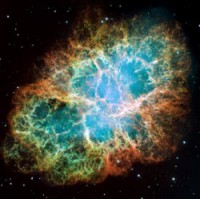 |
Since a neutron star is observed in the center of the Crab Nebula, it is believed that the star that went supernovae was a massive star, many times larger than the sun. When this star ran out of fuel it collapsed to a neutron star, and the outer layers were violently thrown off to form the supernova explosion. This neutron star is a pulsar. It is just a few kilometers in diameter but with a mass equal to that of the Sun and very rapidly rotating (the Crab pulsar rotates 30 times per second, some pulsars ten times faster).
The Crab nebula is about 6500 light years away. The magnitude system had been invented when the supernova was observed (it was invented by Hipparcos, a Greek astronomer). However the Chinese Astronomers who observed the supernova made no estimate of the magnitude. It must have been bright though, as they did record that it was visible during the day for 3 weeks! It shines now as a nebula of magnitude 8.4 near the southern "horn" of Taurus, the Bull.